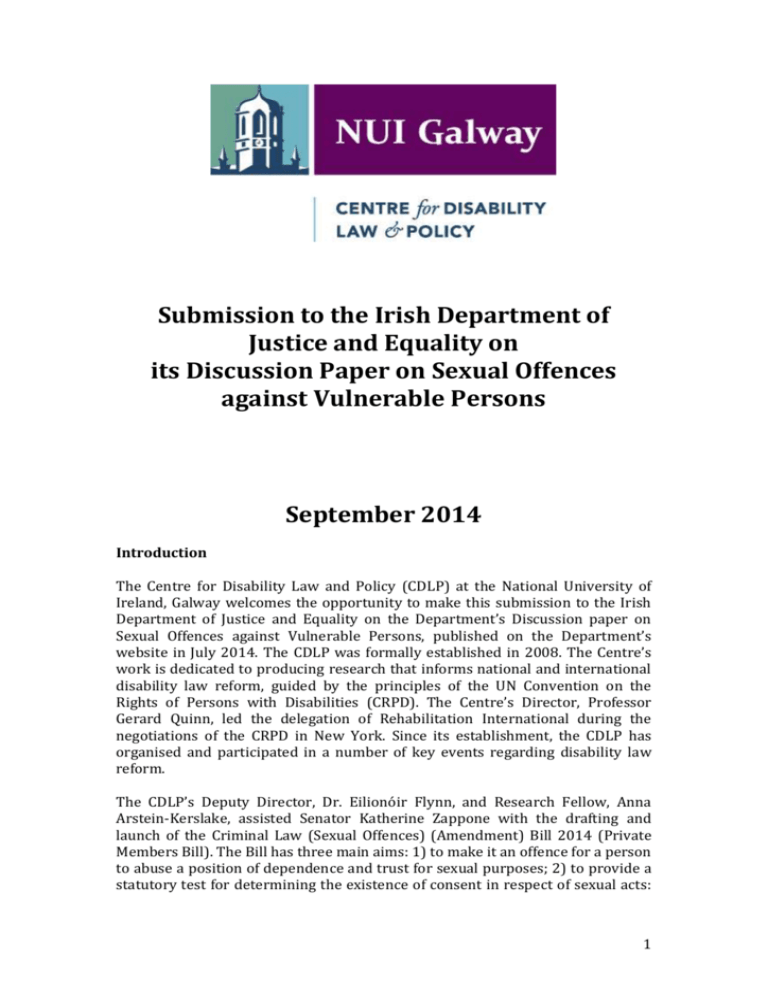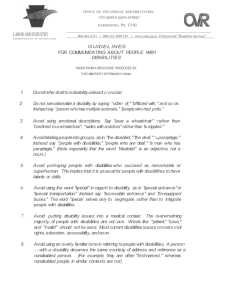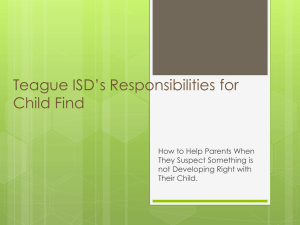
Submission to the Irish Department of
Justice and Equality on
its Discussion Paper on Sexual Offences
against Vulnerable Persons
September 2014
Introduction
The Centre for Disability Law and Policy (CDLP) at the National University of
Ireland, Galway welcomes the opportunity to make this submission to the Irish
Department of Justice and Equality on the Department’s Discussion paper on
Sexual Offences against Vulnerable Persons, published on the Department’s
website in July 2014. The CDLP was formally established in 2008. The Centre’s
work is dedicated to producing research that informs national and international
disability law reform, guided by the principles of the UN Convention on the
Rights of Persons with Disabilities (CRPD). The Centre’s Director, Professor
Gerard Quinn, led the delegation of Rehabilitation International during the
negotiations of the CRPD in New York. Since its establishment, the CDLP has
organised and participated in a number of key events regarding disability law
reform.
The CDLP’s Deputy Director, Dr. Eilionóir Flynn, and Research Fellow, Anna
Arstein-Kerslake, assisted Senator Katherine Zappone with the drafting and
launch of the Criminal Law (Sexual Offences) (Amendment) Bill 2014 (Private
Members Bill). The Bill has three main aims: 1) to make it an offence for a person
to abuse a position of dependence and trust for sexual purposes; 2) to provide a
statutory test for determining the existence of consent in respect of sexual acts:
1
and 3) to amend the Criminal Law (Sexual Offences) Act 1993 by repealing
section 5, which presents significant discriminatory barriers to sexual relations
for people with intellectual disabilities. The broader goal of the Bill is to ensure
that people with intellectual disabilities in Ireland are free to consent to sex on
an equal basis with others and to ensure protection against sexual abuse from a
position of power for people with and without disabilities.
The following submission will highlight the positive aspects of the Department’s
Discussion Paper and will also underscore the areas in which the CDLP believes
there is room for improvement in the discussion paper and its proposal for the
replacement of section 5 of the Criminal Law (Sexual Offences) Act 1993. The
CDLP also welcomes further dialogue with the Department on these issues. At
the outset of this submission, it is important to note the somewhat unique nature
of the CDLP making a submission on criminal sexual offences law. The work of
the Centre focuses on protecting the rights of persons with disabilities. This is
usually accomplished through research and advocacy on legislation whose
purpose is the protection of those rights. However, the law is an unwieldy and
unpredictable instrument whose influence often far outstretches the original
intention of its drafters. Section 5 of the Criminal Law (Sexual Offences) Act 1993
is one such law, as its intention was originally to protect people with disabilities
from abuse. This law does not, nor was it ever intended – nor is sexual offences
law generally intended – to provide explicit protection for sexual autonomy of
persons with disabilities. It is instead intended merely to punish people who
abuse individuals with certain disabilities.
However, the reality is that Section 5 has had a vast and detrimental affect on the
lives of people with disabilities. It has created a pervasive perception among
many service providers, family members, people with disabilities themselves,
and others, that people with intellectual disabilities are not permitted to engage
in sexual relationships outside marriage. It has also failed to provide any
quantifiable level of protection – evidenced by its relative disuse and the lack of
reported cases or judgments on its application. The aim of this submission is to
caution the Department strongly against creating any new law that risks having a
similar affect. This submission is also supported by a number of organisations
working in the areas of disability, mental health, and ageing, including many of
the members of the civil society legal capacity coalition co-ordinated by the
CDLP. A full list of these organisations appears on the last page of this
submission. The CDLP also encourages the Department to pay special attention
to the direct voices of people with disabilities who will make submissions on this
discussion paper – including the Inclusive Research Network and Connect People
Network.
People with intellectual disabilities in Ireland have experienced a long history of
discrimination – strongly evidenced by the number of women with disabilities
placed against their will into Magdalene Laundries1 and other institutional
Report of the Inter-Departmental Committee to establish the facts of State involvement with the
Magdalene Laundries, Irish Department of Justice and Equality, p. III, 855, 861-3, 879-80, 919-20
(2013)
1
2
facilities.2 Section 5 of the Criminal Law (Sexual Offences) Act 1993 is a remnant
from this history of discrimination. The CDLP encourages the Department of
Justice to create disability neutral legislation that reflects the modern movement
in Ireland to fully protect the rights of people with disabilities to the equal
protection and benefit of the law.
The CDLP commends the Department for its efforts to respect the rights of
people with intellectual disabilities to enter into loving sexual relationships, to
repeal section 5 of the Criminal Law (Sexual Offences) Act 1993, and to ensure
compliance with the CRPD. In particular, the CDLP applauds the Department’s
decision not to apply the functional test of mental capacity to the context of
consent to sex in the criminal law. As highlighted by the UN Committee on the
Rights of Persons with Disabilities, ‘perceived or actual deficits in mental
capacity must not be used as justification for denying legal capacity’3 – and this
extends to the exercise of legal capacity in all aspects of life, including consent to
sex.
However, the CDLP is concerned about several aspects of the Discussion Paper’s
proposal, including its use of the stigmatising category of ‘vulnerable persons’
and its attempt to create special laws that treat people with disabilities
differently than others. Generally, the Discussion Paper does not adequately take
into consideration the core concepts of the UNCRPD or Senator Zappone’s 2014
Private Members Bill. While both are mentioned in the Paper, it does not
meaningfully address the issues of discrimination and equal recognition before
the law, which are of primary importance in both the UNCRPD and the Bill.
While it is not within the scope of the criminal law to prohibit discrimination or
promote autonomy per se – the nature of the criminal justice system and its
principles of due process must guard against discriminatory treatment of any
participant in the process. The existence of different standards of proof and
different requirements of consent in criminal cases involving adults with
disabilities from those which apply to other adults should therefore be strongly
cautioned against.
Key Areas for Improvement in the Discussion Paper
Problem 1: Definition of “vulnerable person” includes a requirement of disability.
The most significant problem with the Discussion Paper is that it proposes to
create specific legislation that applies only to survivors of sexual abuse who are
people with disabilities, which the Discussion paper proposes to label as
‘vulnerable people.’ This is problematic because it implies that people with
disabilities should be treated differently than others when it comes to consent to
sex and sexual activity.
Time to Move on from Congregated Settings: A Strategy for Community Inclusion, Report of the
Working Group on Congregated Settings Health Service Executive, p. 10-11 (June 2011)
3 Committee on the Rights of Persons with Disabilities, General Comment No. 1 – Article 12:
Equal Recognition Before the Law, Paragraph 15, UN Doc. No. CRPD/C/GC/1, adopted at the 11 th
Session (April 2014), para. 12.
2
3
The Department was correct to focus on the CRPD in the Discussion Paper. It is
true that the CRPD and its monitoring body, the Committee on the Rights of
Persons with Disabilities, both highlight the importance of providing protection
from abuse for people with disabilities, and in particular women with
disabilities. However, neither the CRPD nor the CRPD Committee intended that
protection to come in the form of legislation that treats people with disabilities
differently than people without disabilities. Evidence for this can be found in the
CRPD’s recently adopted General Comment No. 1 on the Right to Equal
Recognition Before the Law (Article 12). The General Comment specifically
highlights that women with disabilities have been discriminatorily thought of as
not being able to consent to sex (Paragraph 35). It also notes that “the right to
equal recognition before the law and freedom from discrimination requires that
when the State denies legal capacity, it must be on the same basis for all persons.
Denial of legal capacity must not be based on a personal trait such as gender,
race, or disability, or have the purpose or effect of treating the person
differently.” The denial of legal capacity includes the denial of legal capacity to
consent to sex. Therefore, while it is very important for sexual offences law to
recognize when a person does not understand sufficiently to consent to sex, it is
also very important that the understanding required for consent is assessed in
the same way for people with and without disabilities. This requires a disability
neutral sexual offences law.
The creation of specific sexual offences law that applies to people with
disabilities is both discriminatory and under-inclusive. It is discriminatory
because it assumes that there is a fundamental difference in the manner in which
people with disabilities consent to sex. This is inaccurate, as consent to sex is
generally both personality specific (not disability specific) and a natural part of
human interaction. Making sexual offences law that only applies to people with
disabilities is also under-inclusive because it does not take into account sexual
abuse that may occur in a similar way to people without disabilities. It risks
creating a scenario where the prosecutor is forced to prove disability in the
victim in order to prosecute under such a law. This is problematic because the
disability of the victim should not affect the issue of whether he or she consented
to the sexual activity. It should also not affect the issue of whether a person of
trust or authority has abused their position for sexual purposes – this should be
a prosecutable offense whether or not the survivor has a disability. The focus of
an examination of the existence of consent should be the actual interaction
between the parties at the relevant moment in time.
Creating a special offense for ‘vulnerable people’ creates a significant risk of
discrimination, even if the language is changed from that proposed in the
Discussion Paper to language that is not facially discriminatory against people
with disabilities. ‘Vulnerability’ is subjective and may be incorrectly ascribed to
individuals with disabilities based on prejudice or misunderstanding about
disability. Significant training and guidance would need to be put into place to
ensure a non-discriminatory application of a sexual offences law purported to
protect ‘vulnerable people.’ That guidance would need to include information
disseminated to a wide group (service providers, police, etc.) that made it clear
4
that the law intended to protect all vulnerable adults and the existence of a
disability does not, in itself, make an individual a ‘vulnerable person.’
Solution 1: Remove the diagnostic threshold in the definition of “vulnerable
person.”
The problems outlined above may be partially solved by removing the diagnostic
threshold of the definition of “vulnerable persons,” 4 thereby making the
legislation truly disability-neutral. The changes to the text of the proposal bill
would be as follows:
“vulnerable person” means a person
who-
(i)
(ii)
is suffering from a disorder of the mind, or
has a disability
which is of such a nature or degree as it
(a) may cause the person to lacks the necessary understanding to consent to
sexual acts [in certain circumstances] or
(b) may severely restrict the capacity of the person is unable to guard himself
or herself against serious exploitation by another person.
This change in the text of the proposed legislation would also need to accompany
training and guidance that ensures the non-discriminatory application of the law
– as the understanding of what constitutes inability to guard against exploitation
must be carefully interpreted, so as not to allow prejudicial attitudes regarding
the capabilities of persons with disabilities or any adult who may be perceived as
vulnerable to influence this determination.
In a note below the proposed text in Appendix 1, Head X.1 of the Discussion
Paper, the option is presented to also include the clause, “(c) may cause the
person to be incapable of independent living.” The CDLP strongly encourages the
Department of Justice to leave this text out of the legislation. Whether a person is
able to live independently is wholly unrelated to his or her ability to consent to
sex. Someone may need assistance with mobility around the home, but may be
very capable of consenting to sex. Or someone may have an intellectual disability
that requires assistance with daily tasks to the extent that the person lives in a
residential facility, but the individual may still be very capable of consenting to
sex. Very few people truly live independently, those with disabilities or those
without disabilities. Depending on others for tasks around the home and support
for daily living does not inherently make the individual vulnerable to sexual
abuse.
However, it is the position of the CDLP that this problem would be better
addressed by removing the specific offence of sexual act with a vulnerable
For a discussion of the arguments for removing diagnostic thresholds of disability, see Sabine
Michalowski, “Is the MCA’s diagnostic test to assess mental capacity compatible with the
UNCRPD?,” Essex Autonomy Project Briefing Document (21 April 2014).
4
5
person without consent altogether. The stigma attached to ‘vulnerability’ and the
divergence of views as to what factors render an adult ‘vulnerable’ may make
such a provision unworkable. Since the provision covers a range of existing
sexual offences within its remit – and since the Department acknowledge that
sexual exploitation of persons with disabilities could be prosecuted separately
under these existing offences, adding a new provision which has the potential to
further stigmatise persons with disabilities seems unnecessary. If the existing
criminal law offences are found to be unworkable for persons with disabilities or
others who may be considered vulnerable, then perhaps a more sustainable
solution would be to consider whether these offences should be reformed –
rather than introducing another new offence which, like the existing provision in
the 1993 Act, may not achieve its stated goal of protecting people with
disabilities against sexual exploitation.
Problem 2: Narrow definition of a “person in a position of trust and authority.”
In Appendix 1, Head X.1 of the Discussion Paper, a “person in a position of trust
and authority” is defined as a person who is employed or contracted to provide
services or treatment for a vulnerable person. This excludes many informal
carers who may abuse their positions of authority and trust. Incest laws will
cover some informal care, but not all (e.g. neighbours, friends, peers, etc.).
Solution 2: Reexamine Senator Katherine Zappone’s Bill.
The CDLP recommends re-examining the definition of a “person in a position of
trust and authority” in light of the broader definition proposed in Senator
Katherine Zappone’s Bill. The text of Senator Zappone’s Bill states:
“(3) In this section—
‘position of dependence and trust’ includes, but is not limited to, a person who—
(a) provides care,
(b) is responsible for welfare,
(c) occupies a position of authority,
(d) provides education, or
(e) provides support services including therapy or counselling, to the victim.”
The Discussion Paper notes its concern that this definition may be too wideranging and ambiguous. Even if the Department does not take on the full
definition in Senator Zappone’s Bill, the CDLP encourages the Department to
expand the definition beyond merely paid contractual employment.
Problem 3: Clarity on Requirements for Consent
The Discussion Paper proposes that the prosecution have to demonstrate that
the complainant ‘did not consent or was not able to consent’ to prove that the
offence of a sexual act with a vulnerable person was committed. The presence or
absence of consent is clearly central to all sexual offences involving adults,
including persons with disabilities. However, further clarity and guidance is
required, if new language or standards of consent are introduced into the
6
criminal law as the Department proposes. Without this clarity, there is a grave
risk that paternalistic attitudes towards persons with disabilities, and perceived
‘inability’ to give meaningful consent, will re-emerge in the cases taken under
this new offence.
Solution 3: Re-examine Senator Katherine Zappone’s Bill
Section 5A provides the following guidance for determining the existence of
consent:
“(2) In determining the existence of consent, an agreement between the parties
to engage in the specific act must be established.
(3) In determining the existence of an agreement between the parties to engage
in the specific act—
1. (a) an examination of the communication between the parties
immediately prior to the act shall be conducted, and
2. (b) each person must be shown at that time to have understood the
nature of the act.
(4) An understanding of the nature of the act shall only require the person to
understand the physical nature of the act and shall not require the person to
understand possible physiological consequences of the act.”
The CDLP believes that this formulation strikes the appropriate balance in
determining whether valid consent was provided, without imposing too high a
burden on the complainant, especially with respect to the level of understanding
required before a person can validly consent to sexual activity. The requirement
to examine the communication ‘between the two parties’ also ensures that the
burden does not fall solely to either the complainant or the defendant to
demonstrate the existence or absence of consent. If the Department feels that
this formulation is too broad, the CDLP nonetheless encourages the Department
to provide greater clarity on the term ‘did not consent or was not able to consent’
which forms part of its definition of the new offence proposed.
Conclusion
The Department of Justice has an opportunity with this Bill to provide a long
overdue remedy for the stigmatizing and damaging Section 5 of the Criminal Law
(Sexual Offences) Act 1993. This opportunity must not be taken lightly because it
is the opportunity to provide people with disabilities in Ireland the space and
freedom to be respected as sexual decision-makers – a right which has been
ignored for too long. The Centre for Disability Law and Policy is ready to put its
comparative research resources on disability, sexual offences, and consent, at the
Department’s disposal for this important reform, and would welcome further
engagement with Minister Fitzgerald and her officials on this issue.
7
Appendix – List of Organisations Endorsing CDLP Submission
Recovery Experts by Experience (REE)
8








